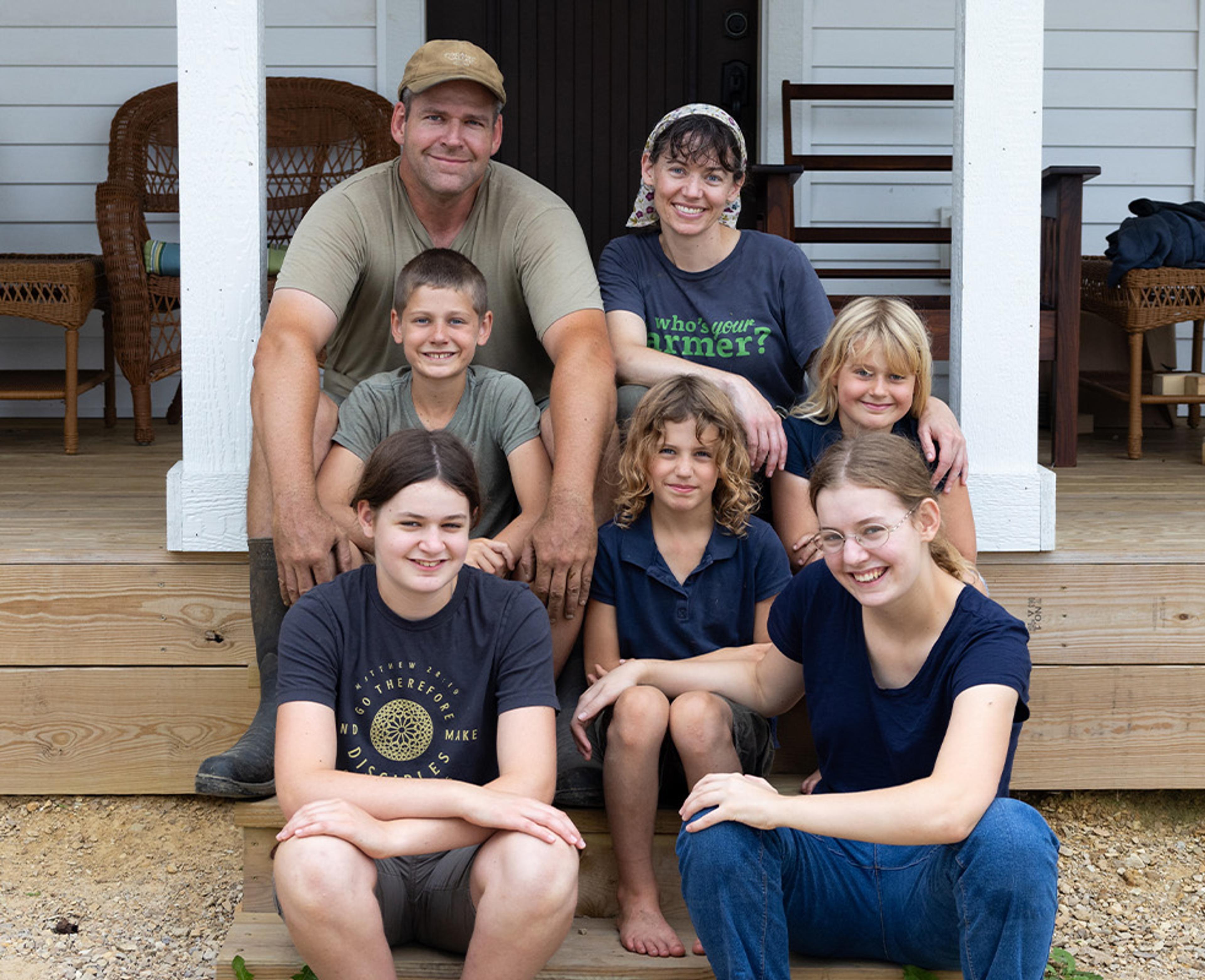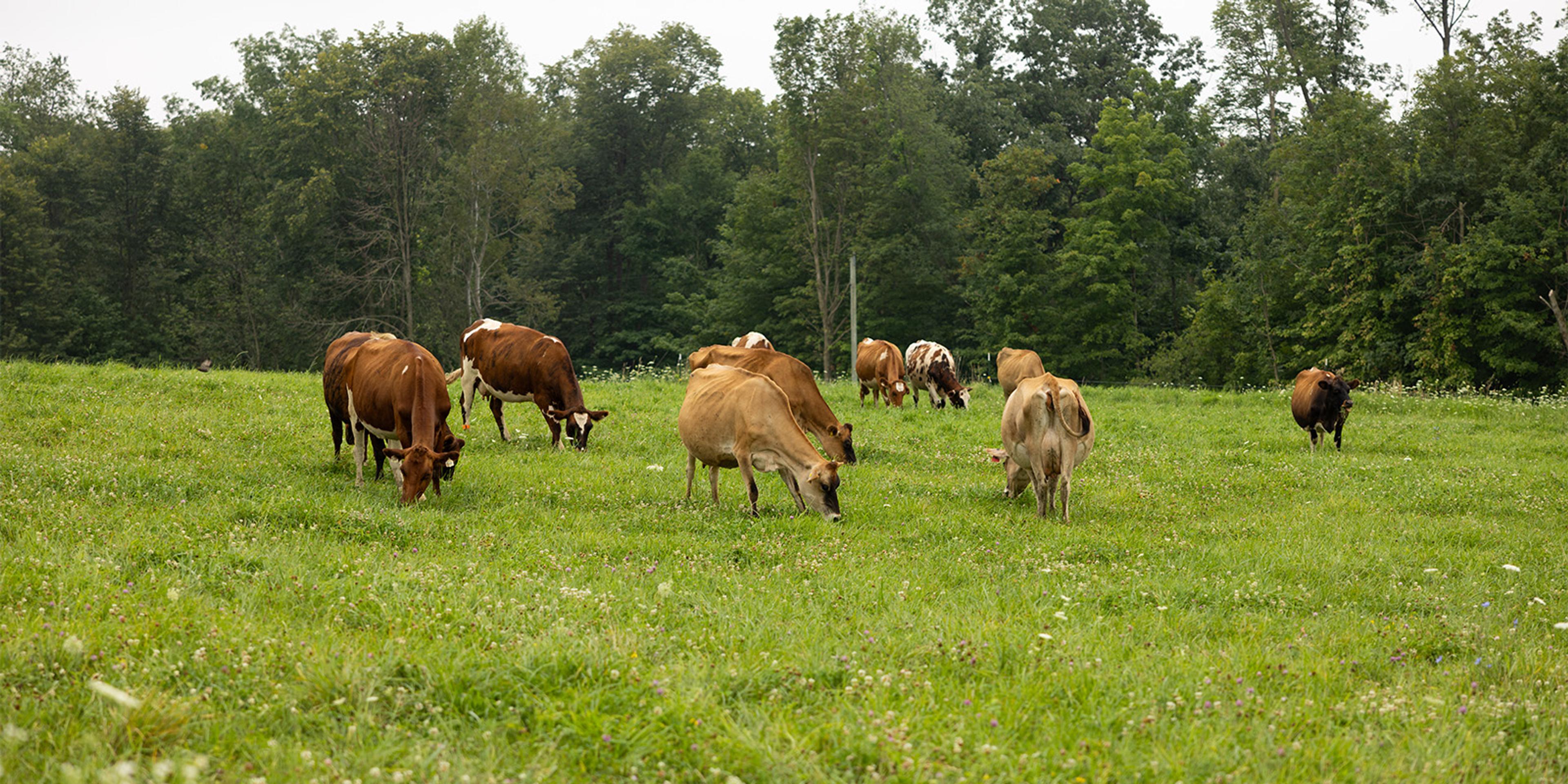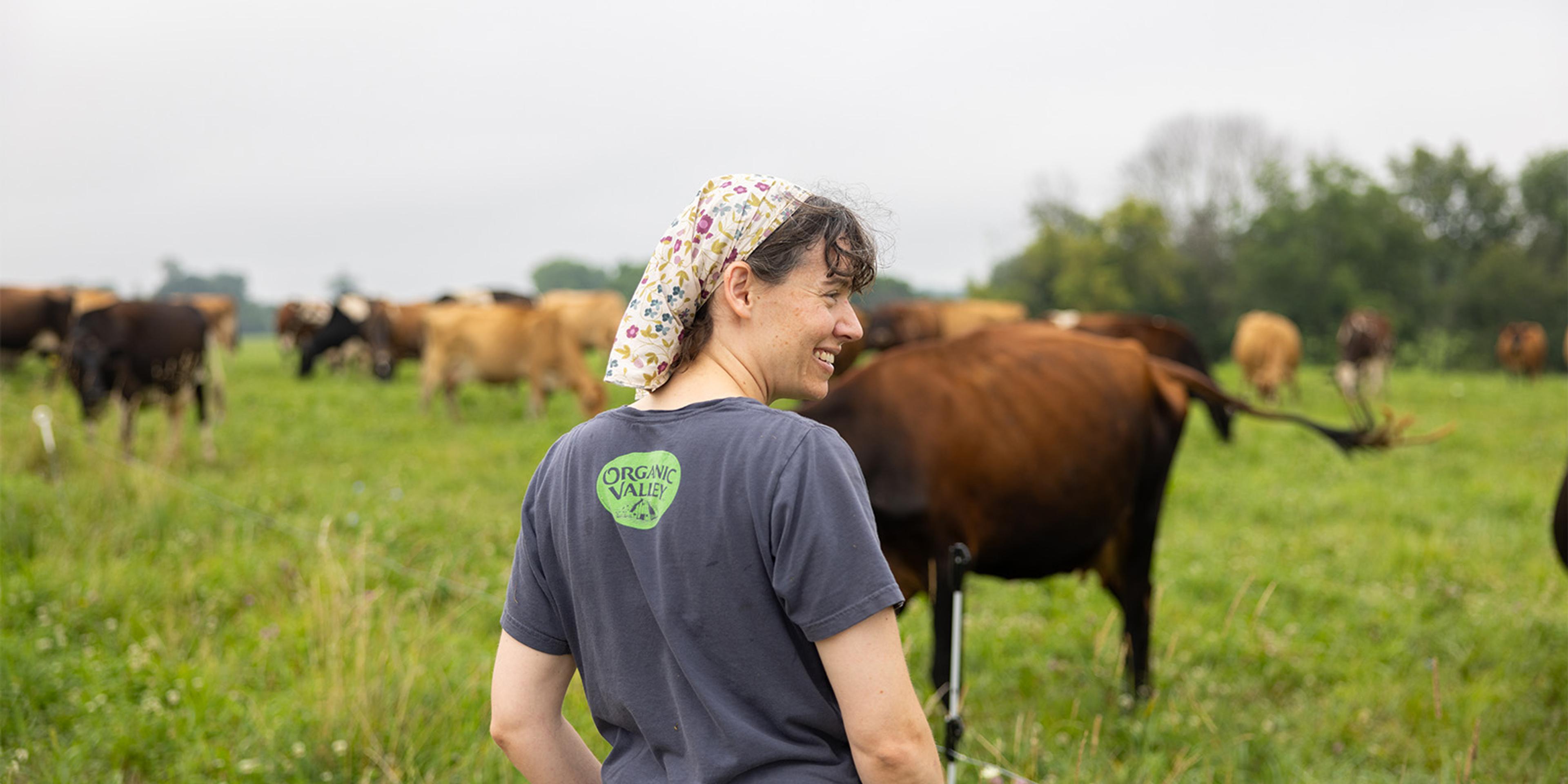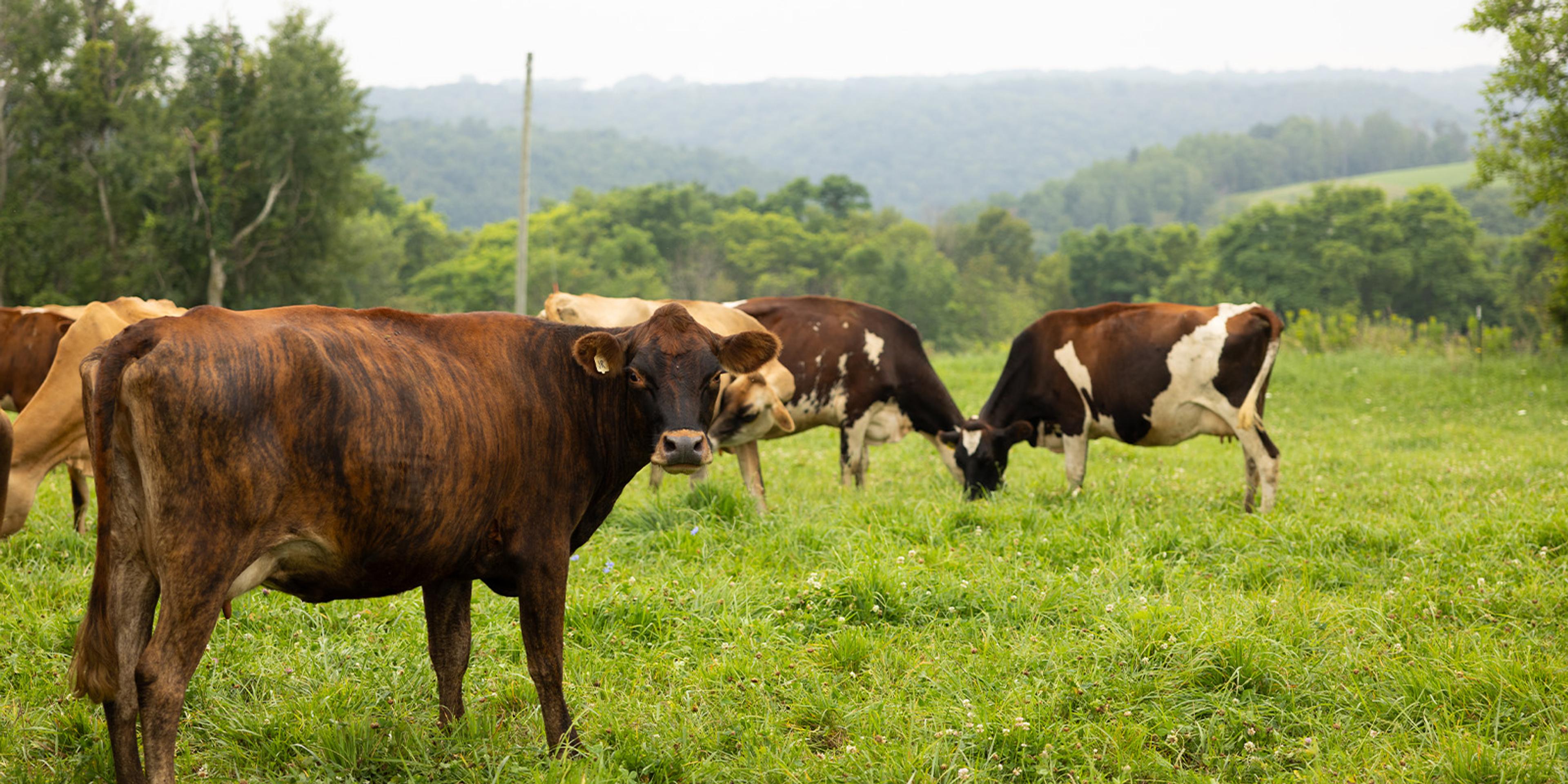
Farming
First-generation Farm Family Safeguards Water, Soil and Community
The Canter family calls Highland Farm in Cashton, Wisconsin, home. The farm and family have expanded since moving there in 2014, and their sustainable practices help protect the land they share with the community. Though they’ve faced hardships, the organic dairy farm is bubbling with life.
Life Before Organic Farming
Matthew and Ashley Canter lived in several places before venturing into the world of farming and joining Organic Valley.
Matthew worked in the ministry, graduating from Ohio University with a degree in theology. His first assignment was in a small seminary in Wisconsin in 2008, but they didn’t stay there long. Even though they now live in Cashton, their first stint in Wisconsin was short-lived. The family bounced around, moving to San Diego County and then back to Ohio.
They seriously began investing in farming the second time they lived in Ohio. With a few acres of land, a garden, some chickens and just enough sheep to keep their border collie happy, the Canters took the first step in their lifelong journey of farming.
“I loved it there, but we kind of wanted to move on and establish ourselves a little more permanently,” Ashley said. Wisconsin kept creeping into the conversation of where to settle down.
Eventually, Matthew found a job at an area diocese, and the family packed up to move back to Wisconsin. They moved to Wisconsin again in 2014 with their three children and settled into the farming lifestyle. By 2016, Matthew left the ministry to farm full time and the family had grown to five children.

Cows on organic pasture at the Canter farm.
Full-Time Farmers
Although Matthew was on a stable path in the ministry, his interest in farming never went away. He was determined to bring their small farm off the ground so they could farm full time.
“I would have been happy with a hobby farm and health insurance, but my husband does nothing small,” Ashley said.
But they wouldn’t have been able to grow their farm without some good luck and help from the community. A local couple were retiring from farming and selling their herd of Jersey cows. They knew the Canters wanted to get into dairy, so they offered to show them the ropes.
The couple provided milk to a local creamery for decades and kept the cooperative spirit alive when they sold their cows.
“It wasn’t just that we bought a herd of cows; it was that a legacy of some really storied people here in the county was passed on to us,” Ashley said.
Struggles in Establishment
The Canters purchased the cows in 2017. The first years were difficult; the dairy market was in flux, and many farms were struggling to turn a profit. However, the Canters were “remarkably secure,” because the creamery they contributed to was a cooperative. Because the cooperative was owned by many small farmers like them, their voices could be heard.
Much like Organic Valley, where the farmers own and run the cooperative.
Then came the 2018 flooding — a generational stretch of storms in the Driftless region, the area where the Canters live. Intense thunderstorms battered the region, sending washout down the ridge and into the water sources. Each time it rained, the Canters hoped it would be the last. But as Ashley said, “It kept raining, and every time it rained, the destruction was just obvious.”
The following year, the flooding continued, and 2019 was the second wettest year on record. Extreme weather poses serious threats to farmers across the country, including crop loss, contamination and soil erosion. The long-lasting damage a flood can cause can be catastrophic.

Ashley Canter
Protecting the Water
Being on top of the ridge, the Canters weren’t as badly affected as some farms, but they had a duty to the farmers at the bottom of the ridge. The washout from their farm could go down the hill, and, though it wouldn’t directly affect their farm, it could taint the water supply and harm the rest of the community. “There was desolation, but there were also answers,” Ashley said.
For the Canters, those answers came in the form of deep-rooted perennial pasture mixes that prevented erosion. That meant moving their cows without hurting the land or dealing with mud. It involved maintaining pasture rotations to prevent overworking the land. The effects were obvious — the once-abundant bees and butterflies were coming back to the pasture.
Like so many Organic Valley farmers, they have also become advocates for healthy soil and watershed practices.
“If we’re going to be here, we have a responsibility to help slow it down to encourage soil health to build up healthy vegetation to engage in livestock practices that are actually good for the environment. It’s been a pleasure to be a part of it,” Ashley said.
The Grace of Strong Community
Building back the environment produced numerous positive effects they hadn’t planned for. Wildflowers line their pastures, butterflies soar freely and goldfinches nest in the tall grass.
“It wasn’t what we were going for, but it’s one of the things that happened. It’s just a grace. It’s tremendous grace,” Ashley said.
Beyond their wildlife community, the family began noticing the human community surrounding them on the ridge.
“We started to realize this is a thriving little community, and I’m not even talking about people who have cows,” she said. “This is a really bustling place, and it’s been fabulous to see it grow.” Their neighbors are farmers in their own right, producing maple syrup, dairy and poultry. Many Organic Valley farmers populate the ridge, as well.

The Canter farm, Wisconsin.
Why Farm Organically?
In 2021, the Canters transitioned to Organic Valley, and their first milk pickup was in April 2022.
The family produces Organic Valley Grassmilk® milk and is dedicated to keeping their herd healthy. They rotate their grass-fed cows between pastures twice a day.
Like many Organic Valley farmers across the nation, the Canters rely on consumer support to produce delicious, environmentally friendly products.
“When they choose us, they are keeping cows eating grass. They’re keeping more birds nesting. They’re keeping more families on the land and taking care of it,” Ashley said. “Organic Valley really is different because everything that they’re picturing — they want happy cows eating grass and families growing and thriving — we can do that here.”
The family has seen the benefits of operating their farm sustainably, and Ashley advocates for more families going organic, “I would like to see that become the norm in agricultural production.”
"This is real. It’s all worth it. All the sunrises and sunsets and late nights and moments when you turn around and go, ‘this is good.’"
- Ashley Canter
Noah Nelson is a copywriting intern with Organic Valley. From Westby, Wisconsin, Organic Valley has been in Nelson's backyard his entire life. He started working as an intern at the cooperative this summer. He graduated from Viterbo University in 2024 and plans to attend the University of Oregon for his master's in Multimedia Journalism. Outside of work, Nelson likes to golf and travel, and he has several writing projects in the process of publication.
Related Articles
- Tags:
- farm life


















